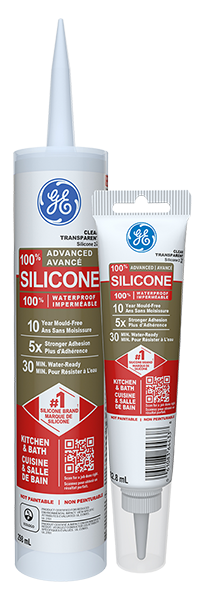The gaps around the edges and joints of a kitchen counter are a perfect trap for crumbs, water and humidity. If these gaps are left unsealed or the sealant is old and cracked, you could experience problems like mold, mildew and rot in your walls or cabinets. Prevent these problems before they start by learning how to seal kitchen counters with silicone sealant for lasting protection against mold and water damage.
Tools & Supplies for Sealing Counters
Picking the right sealant can make all the difference. For sealing a kitchen counter, bathroom counter or anywhere water could be present, choose a GE-branded 100% silicone sealant, like GE Advanced Silicone 2® Kitchen & Bath sealant. This sealant is 100% waterproof, permanently flexible and has 10-year mold-free product protection1 and strong adhesion to create a watertight, mold-resistant seal.
Whichever product you choose, check the packaging to ensure the sealant will adhere to your countertop material without staining it.
Pro Tip: 100% silicone sealants are not paintable so be sure to pick the appropriate color for your project.
Besides a GE-branded 100% silicone sealant, you will also need:
- Caulk gun
- Painter’s tape
- Latex gloves
- Soapy water
- Paper towels
- Utility blade
- Caulk tool
- Mineral spirits
- Isopropyl alcohol
Once you have all the tools and supplies you need for this project, you’re ready to seal a counter with these six steps:
-
Start with a Clean Surface
Whenever you start a new sealing project, make sure you have a clean work surface by wiping it down with isopropyl alcohol. If you’re replacing old caulk or sealant, completely remove it first, then wipe down the area with isopropyl alcohol. Let the surface dry before laying a new bead.
Safety Tip: Make sure your work area is well ventilated when using isopropyl alcohol.
-
Apply Painter’s Tape
For a smoother bead and easier cleanup, apply painter’s tape on either side of the area you’re sealing.
-
Carefully Cut the Sealant Cartridge
Next, prepare your sealant by cutting the tip of the cartridge. Cut the cartridge tip at a 45-degree angle so the hole is about the same size as the area you’re sealing. Some caulk guns have a tool to cut the cartridge tip, but we recommend using a utility blade for consistently clean results. Cut off less than you think you’ll need because you can always cut more. Once cut, pierce the cartridge’s inner foil seal using the metal rod on your caulk gun or a long nail. Then load the sealant cartridge into the caulk gun.
-
Apply Sealant
Now that your sealant and work area is prepped, apply sealant along the edge of the counter where it meets the wall or backsplash. As you work, pull the gun toward you and maintain a relaxed grip and steady speed. If you can’t make it in one pass, it’s ok to readjust your grip and start where you left off. Fill gaps with additional sealant as needed.
-
Tool the Bead & Remove the Painter’s Tape
Use a caulk tool or your finger to tool the sealant bead until it’s smooth. It’s important to tool the bead before the sealant starts to cure, so if you need to, you can tool in sections. Run a short bead of sealant, tool the bead, then repeat as many times as needed.
Pro Tip: To aid in tooling, dip your finger in a mixture of dish soap and water.
Then, immediately remove the painter’s tape before the sealant has a chance to cure. Remove any excess or unwanted sealant with mineral spirits.
-
Let Sealant Cure Completely
Finally, allow the sealant to cure completely for the best performance. GE Advanced Silicone 2® Kitchen & Bath sealant is water-ready in 30 minutes2 and fully cured in 24 hours, but check your product for specific curing instructions.Now you have a 100% waterproof seal that will help keep your countertops protected from mold, mildew and more. For more step-by-step sealing tutorials with high-performing GE-branded sealants, check out our other How-To guides.
1Cured sealant is resistant to stain causing mold and mildew. Regular cleaning of the cured sealant is required, however, as soap and other residue can cause secondary mold and mildew growth.
2Exposure to water possible in as little as 30 minutes with bead size max 3/16””, temperature min 65oF and humidity min 50%. Otherwise, sealant should not be exposed to water for 8 hours. Do not touch or clean sealant for 24 hours.

